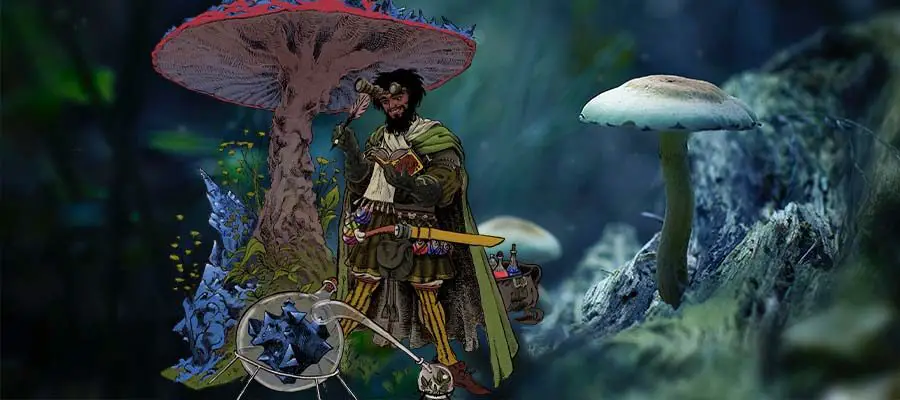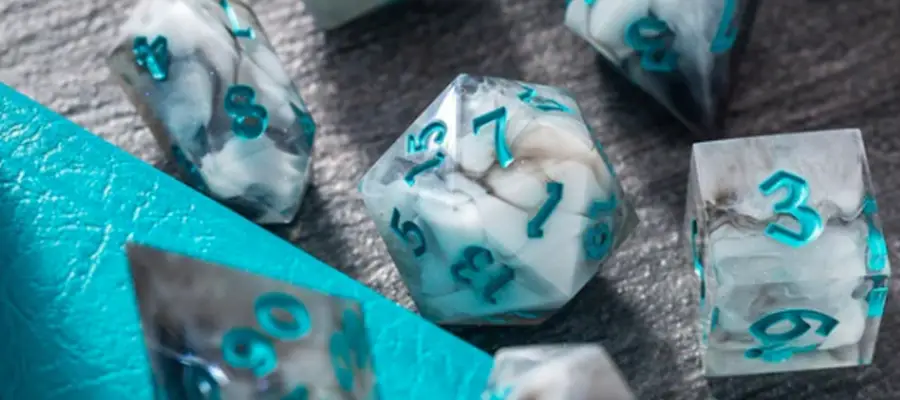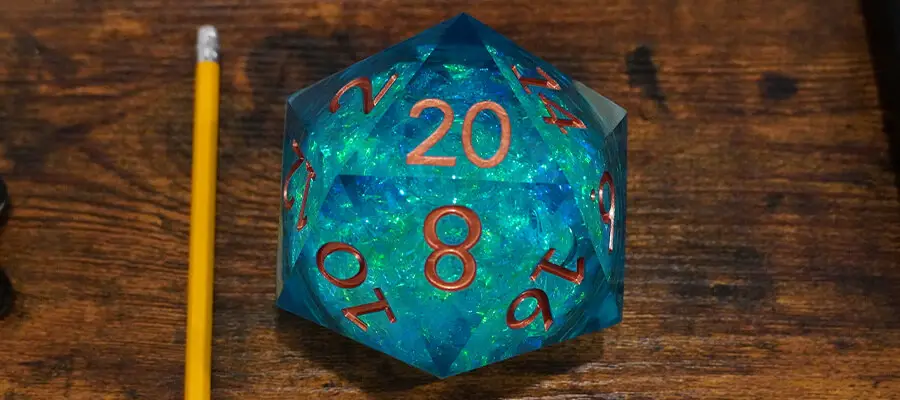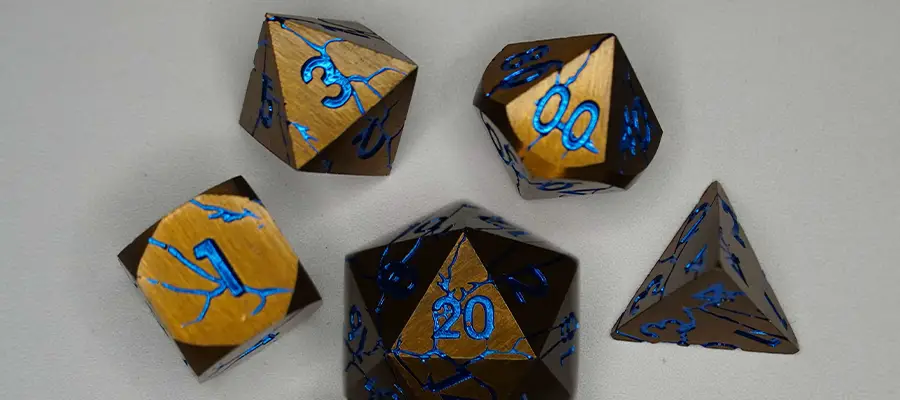Alchemist Class D&D 5e featured art is a combination of commissioned art by Taron Pounds from Maxwell Polikoff and a photograph by Monique Laats via Pexels.com. This article contains affiliate links to put gold in our coffers.
There’s a brand-new class for D&D 5th Edition provided by a third-party creator (unofficial play material). I’m reviewing and recommending The Alchemist playable class by Taron “Indestructoboy” Pounds, a fellow YouTuber (and occasionally a writer for Flutes Loot). It’s available on the DMs Guild. You can currently buy it for $9.99. A full preview of the Alchemist class document is available on the DMs Guild before buying.

I’ve become a fan of Taron’s work because I’ve noticed a lot of third-party content focuses on quantity over quality. But Taron is a pro designer. He is a quality kind of designer.
The Alchemist is Taron’s first DMs Guild new class design, but it’s the first one with which I’ve engaged. Full disclosure, I listened to his live streams while designing the class. I was part of the playtest and feedback phase on his discord. I’m in the credits for playtesting and line editing (volunteer work).
— Creating an Alchemist
— Alchemist Core Features
— Animator Subclass
— Apothecary Subclass
— Fulminare Subclass
— Salbenist Subclass
— Toxicologist Subclass
— Why Buy the Alchemist?
Non-Magical Alchemist Class (Not an Artificer)
This Alchemist design does not rely on magic and spellcasting. It’s supposed to be an answer to the Artificer class that fell short with many players’ fantasies of gathering ingredients to brew potions and concoctions (especially its Alchemist subclass). This class specializes in using what it creates, not casting spells flavored to suit artifice.
This Alchemist has a rustic, old-school RPG feel. It uses existing fighting mechanics and doesn’t try to ignore them or circumvent them. The Alchemist class pdf includes content to review existing 5e rules, so you’re not going in blind. Taron did his homework.
Is There an Alchemist in D&D 5e?
The only official alchemist in D&D 5e is the subclass for Artificers. However, that subclass doesn’t fulfill the desired fantasy of an alchemist. That’s why I recommend the Alchemist class by Taron Pounds. It’s unofficial, but it’s better than most official 5e content.
Can You Be an Alchemist in D&D 5e?
Certain character options can be re-flavored to resemble an alchemist archetype, but D&D 5e’s crafting and herbalism mechanics are sparse and dull. They take too long and cost too much. This is why third-party content is the way to go for creating a proper alchemist character.
Creating an Alchemist Character
The Alchemist is a d8 class with five ASIs (standard). It’s an Intelligence-based character.
It has proficiency with light armor, simple weapons, and blow guns. It feels like you can have fun with blowguns and poisons.
Taron doesn’t ignore the fact that multiclassing is a thing. The multiclassing rules demand at least a 13 in Intelligence for the Alchemist to be part of a multiclass character build. Sometimes I see classes designed where they ignore multiclassing implications, enabling crazy combinations. I’ve seen Taron actively change his designs based on realizing synergies with certain multiclass combinations that he didn’t want to allow.
The most-used action is the Use an Object action, not the Attack action. The go-to bonus action is called Catalyze. The Alchemist plays a mid-liner role because its range with potions and alchemical items isn’t as long as long-range weapons.
Here is my video review of the class followed by Taron’s own how-to-play video for his class.
Alchemist Core Class Features
I will summarize each core feature that makes the Alchemist fun and interesting to play. It’s deceptively simple compared to other Alchemist class concepts I’ve seen. My favorite part is that it doesn’t ignore existing D&D 5e rules and mechanics; it builds on them!
Alchemist Class Features: Experimentalist Adept (Level 1)
The Experimentalist Adept feature makes it so that you can provide five gold worth of raw materials to craft any alchemical item. You know the formula for that is worth fifty gold or less.
This part of the Alchemist class functions similarly to Wizards learning spells.
You learn alchemical item formulas; you craft them cheaper and faster. Many alchemical items cost 25-50 gold if purchased with the prices in the Player’s Handbook. You craft them for five gold during a long rest (instead of requiring days or weeks). There’s a limit to how many you can craft during rests based on your Intelligence modifier and your Alchemist level.
You also basically have Expertise in alchemist supplies (double PB).
Alchemist Class Features: Alchemy (Level 1)
This feature contains several sub-features to bring the class together. They include Formulae, Catalyze, and Potency.
Alchemy Sub-feature: Formulae
You know a few basic formulas: acid, alchemist fire, antitoxin, basic oil, perfume, soap, and two more of your choice. And each time you get a level, you learn another formula. You can also find potions and alchemical items to study their formulas.
Alchemy Sub-feature: Catalyze
Catalyze gives you a bonus action for your action economy that allows you to quickly create an alchemical item with a brief shelf life of one minute, basically only to be used in combat.
Alchemy Sub-feature: Potency
We’re going to enhance our Alchemist abilities with Potency. The first benefit regards close-quarters combat while throwing alchemical items. Like the Crossbow Expert feat, Potency allows you to ignore disadvantage on ranged attacks while enemies are next to you.
Additionally, you can throw alchemical items twice as far. You’re a mid-liner, but items limited to 20 feet throwing distances are difficult to use. With this feature, you can throw 40 feet instead.
Finally, you can use your Intelligence modifier for making attack rolls with alchemical items. This means you can avoid becoming a MAD class. An item with a fixed DC usually wouldn’t scale throughout the game, but you can use your Intelligence and PB to set the DC. This flexibility makes the Alchemist the best user of many adventuring items that would typically be useless after tier one of play.
Alchemist Class Features: Eureka (Level 3)
Eureka is another essential feature of this class. Eureka builds on the Catalyze feature’s bonus action to create a common-rarity potion for which you know the formula. The rarity of the potion scales as you level up.
Notice here that when you use Eureka it is also including Catalyze because you’re using the same bonus action as Catalyze, meaning it has the same limitations of raw materials and one-minute efficacy. You must use the potion quickly within one minute when creating a potion in this way. The time limit will later rise to ten minutes.
Alchemist Class Features: Methodical Efficiency (Level 3)
Taron realized that the Thief Rogue could use an object as a bonus action, making that character option the best at utilizing alchemical items. Wanting to compete with that option, the Alchemist can take the Use an Object action as a bonus action. Remember, the Use an Object action doesn’t work for magical items like potions.
Alchemist Class Summary
I won’t go through the rest of the Alchemist’s kit, but it has the proper scaling at the correct levels to keep up with core D&D 5e classes. It fulfills what I want to see from an Alchemist as it gains unique features to mix alchemical items, create a philosopher’s stone, and more!
Alchemical Practices (Subclasses) for the Alchemist Class
The class is solid, but it also gets incredible subclasses! These subclasses often feature upgrades to specialty alchemical gimmicks that scale to become stronger at higher levels.
Alchemist Subclass: the Animator

The Animator Alchemist utilizes primordial alchemy to create little constructs that are alive. A summoned homunculus resembles the Artificer’s homunculus infusion. The homunculus obeys your telepathic commands (no action required).
It’s a tiny construct with a bit of flight, poison immunity, and exhaustion immunity. It has an evasion mechanic, and you can infuse it with material components for five gold to enhance it.
My favorite enhancements to the homunculus are acid spit, eagle vision, and blind site. If you are a small-size Alchemist, the homunculus’ tiny body can grapple you and lift you up into the air with its flight (per the push/pull rules).
You can cast the Animate Dead spell, but it’s not flavored like a spell. You can imagine it as alchemy, not spellcasting. You’re not using spell slots, and you’re not raising a dead creature back to life. You can only cast this as a ritual, which is a perk! You require a drop of blood, a piece of flesh, and a pinch of bone dust as raw materials.
The ritual creates a skeleton or zombie. You treat it as a construct, not undead. You give it a hit point boost based on your Alchemist level, and you have telepathy with it. And you can only do this with one body at a time.
Level fourteen is fun because you can mash up your homunculus and zombie into one Flesh Golem that gains all the features of your enhanced homunculus. That’s right; it’s a flying Frankenstein’s monster with acid spit.
Alchemist Subclass: the Apothecary
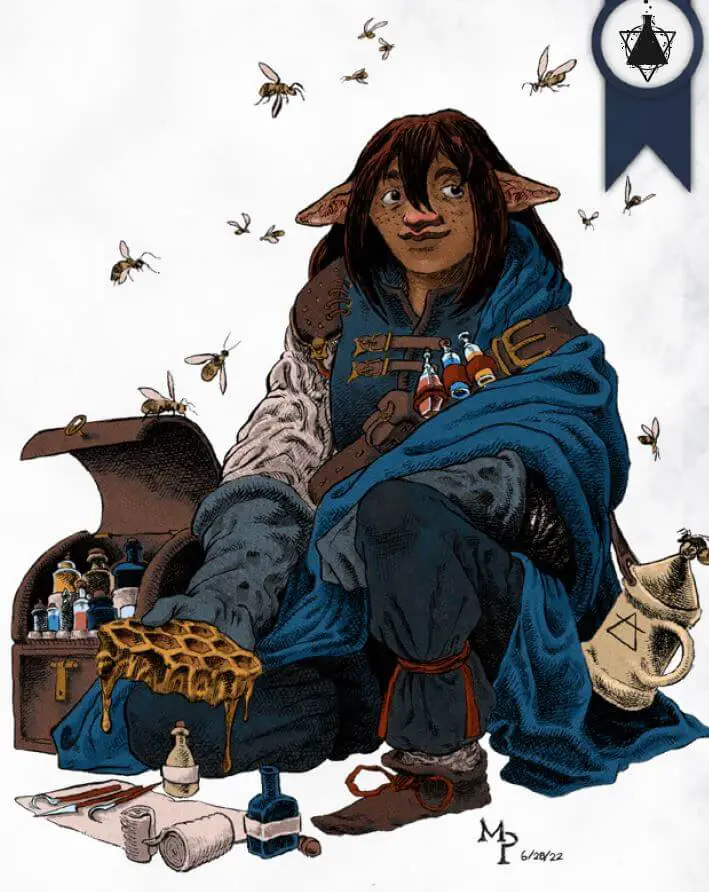
We have the Apothecary, healing with medicinal herbs. You can take five gold worth of components to enhance the alchemical item or potion you make that restores hit points, so you heal better. The next time the consumer makes a saving throw, it’s the next minute they can roll a d4 and add the number to the save and then troll’s blood.
You can give someone a regeneration of one hit point per turn for one minute. For five gold, you’re making your healing potion heal for a flat ten hit points more outside of combat or ten over time in combat. But it stops working if you take aster fire damage like a troll.
Sweet Succor enhances your healing. The first healing role of the item gains a bonus equal to your Intelligence modifier. You also get advantage on Medicine checks to stabilize creatures.
I like the Powder Gems feature because it makes it so if someone is afflicted by any condition, not just poison or disease, they get to attempt that saving throw immediately. You potentially stop them from being paralyzed! They don’t have to lose a turn because you heal them sooner.
You can restore those limbs and raise the dead at level ten with your alchemical prowess.
Alchemist Subclass: the Fulminare

The Fulminare is your bomber and has the best art in the document. Bomber frog!
Fulminares can daze and shellshock enemies, mess up spell concentration, and turn single-target items into blast effects in an area. It can toss a bomb centered on its current position while using a reaction to ditch the blast area.
It can blow up buildings and constructs with ease at later levels. It’s a mad bomber character, so it does what you expect (plus several surprises).
Fulminares have potential to transmute items to dish out altered damage types than they normally would.
Overall, the Fulminare’s ability to turn alchemical items that are usually mild in their effects into blasts to remember makes the Fulminare a favorite of any player looking to blow stuff up. The blast areas increase, the damage types are versatile, and the added effects are devastating. Doors won’t stand a chance!
Alchemist Subclass: the Salbenist

The Salbenist is thematically similar to a Bladesinger Wizard; it wields a blade, applying alchemical oil to its metal for a quasi-magical effect. The oil in the edge can be activated to light the blade on fire or produce other effects depending on the type of oil soaked into it. It gets proficiency with medium armor and martial weapons (with some limits).
The oil application involves a ritual to anoint the blade. When you attack with the anointed weapon, you can use Intelligence for attacking damage.
The level-ten feature is fantastic. It can absorb the elemental damage type of the oil anointing the blade, reducing damage and restoring hit points. If the Salbenist reaches full hit points, the remainder converts to temporary hit points.
Players who enjoy spell-sword character archetypes will enjoy the Salbenist.
The Salbenist specializes in a mechanic often referred to as “exploding dice” where rolling max values results in rolling more dice. At low levels, the exploding dice mechanic is limited, but at higher levels it gains infinite potential (no cap).
Naturally, this subclass also gets Extra Attack (standard for weapon wielders).
Alchemist Subclass: the Toxicologist
The Toxicologist specializes in poisons without falling victim to the fact that many monsters resist or ignore poisons. Any damage dealt by the Toxicologist can become necrotic with alchemical tinkering. Taron is conscious of how bad poison damage is in D&D 5e. He gives you options inspired by other designs.
Toxicologists can stack damage on a target with a poison that adds d6 poison damage once per turn to other attacks. More allies attacking the victim equals more damage.
Victims of poisons made by the Toxicologist will experience penalties to their saving throws made to maintain concentration. Toxicologists gain resistance to acid and poison damage. They can even become immune to poison if they already resist poison from their racial traits or in some other way.
At later levels, the poison concoctions can ignore damage resistances. It’s a smart subclass design that overcomes the shortcomings of poison as a damage type and condition.
Alchemical Items and Rules Supplements

Another fantastic resource in this Alchemist class document is a list of new alchemical items and tools. These supplemental materials elevate the Alchemist by giving it potent, versatile options. These items can also be easily dropped into your 5e game as dungeon loot or shop-shelf inventory.
You’ll summaries of existing items alongside new utility items, combat items, oils, and more!
Why Buy the Alchemist Class?
I want to see third-party creators give WotC a run for their money (literally). I believe WotC designs have been disappointing and lazy recently, but the homebrew scene has outstanding content from diverse talents. Please consider supporting creators who lack corporate budgets and red tape to hinder their designs.
The Alchemist is an intelligent, fun class. It nails the class fantasy players are looking for without reinventing the D&D 5e system. Alchemists can quickly be inserted into your campaign without creating more work for the DM and with minimal learning curves for players.
You can purchase the Alchemist class by Taron “Indestructoboy” Pounds on the DMs Guild. Let me know if you check it out!
Cast Message in the comments if you want to talk about this subclass. I’m happy to answer questions if you’re on the fence about whether or not to buy it.

